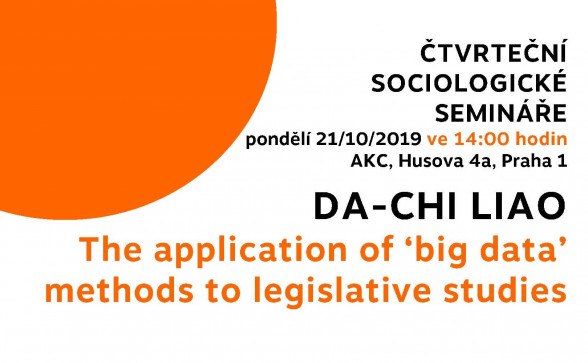Sociologický ústav AV ČR, v.v.i., a katedra sociologie Institutu sociologických studií FSV UK si Vás dovolují pozvat na podzimní cyklus Čtvrtečních sociologických seminářů.
The lecture on application of “big data” methods to legislative studies involves three major parts. First is to brief the meanings and the functions of ‘big data’ methods. Second and third are to explicate how to use information technologies (IT) to supervise legislatures and to analyze legislatures, respectively. In regard to IT techniques used to supervise legislatures, this speaker would introduce iVoter website (http://ivoter.tw/) that was founded and has been keeping on operation by her nearly 10 years (2010-). The main function of iVoter is to match a voter’s policy preferences with those of his/her country’s political parties or candidates. This kind of preference-matching mechanism is often called Voting Advice Applications (VAA) in current literature. The speaker would further illustrate how to use data gathered from iVoter to supervise legislatures. The third part of the lecture regards using text-mining techniques to analyze both legislative documents and social media data that concern legislators. Three papers mainly authored by this speaker would exemplify how this kind of work has been done. These are: “Parliamentary Oversight in ‘Atypical Foreign Affairs’ under Semipresidentialism– a Comparison of the French National Assembly, Romania’s Parliament and Taiwan’s Legislative Yuan.” (2014) “The Effect of Social Movements on Representative Deficit: A Study of Two Taiwanese Cases.” (2017) “Legislators’ Utilization of Facebook and Their Legislative Performance- A Case of Taiwan (2016-2018).” (2018)
Dr. Da-chi Liao is a distinguished professor of Graduate Institute of Political Science at National Sun-Yat-sen University (NSYSU), and received her Ph.D. in Political Science from the University of Michigan in 1990. She has long been focusing on legislative studies, constitutional design, identity problems, information technology and politics, election and politics. From 2004 to 2006, she served as the president of Taiwanese Political Science Association. She has published more than 70 refereed journal articles ever since 1990, and edited two books before 2006: American Policy in Asia Pacific Region After 9-11 (2002), and Democratization, Globalization, and the Role of Parliaments (2006, in Chinese). In recent 10 years, she has been devoting significant time to study how to utilize ICTs (Information and Communication technologies)as a tool to analyze politics as well as to improve the quality of democracy in Taiwan. She has been working with information technologists to employ text-mining techniques doing content analyses either on legislative documents or on social media, such as Facebook or Taiwan’s BBS. She has also cooperated with European University Institute (Florence, Italy) to set up the iVoter website (http://ivoternet.org/) as a communication platform between Taiwanese voters and legislative candidates for the 2012, 2016 and 2020 elections. This effort was then published into two books. One is entitled as “iVoter: A Record of Taiwan’s Internet Democracy,” (2013, in Chinese) and the other is: Political Behavior and Technology—Voting Advice Applications in East Asia (2016 in English by Palgrave & Macmillan).
The event is supported by CAS cooperation activity with leading research institutions in South and Southeast Asia, 2019.
Seminar will be held in English. No registration is needed.


Newsletter
Facebook
X
Tweets by SociologickyNewsletter